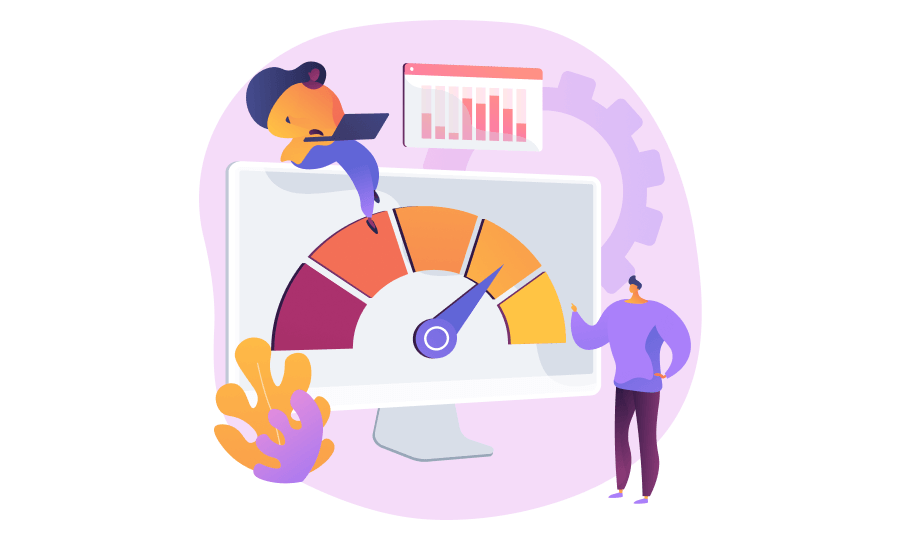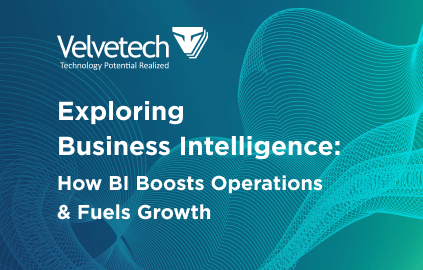There’s no doubt that business processes undergo a drastic change in many industries, insurance included. Consumer behavior has shifted dramatically, and players within the sector have to rethink their priorities.
Deloitte’s global insurance outlook revealed the shift to a more customer-centric business model that will require advanced technology adoption. Insurance software with data analytics tools is one of them.
“The evolving operating environment should put even more pressure on insurers across sectors to increase the use of automation, AI, advanced analytics, and core transformation in the year ahead.”
— Deloitte
With the data volume growing rapidly thanks to the digitalization of the modern world, it’s easy to see why business leaders within the insurance industry are eager to engage data analytics service providers. After all, it’s where all the customer behavior and risk insights lie.
Today, we’d like to dive deeper into the priorities industry leaders have specified for the near future and how data analytics tools for insurance can help address them. Let’s get started.
Why Should Insurance Firms Care About Data Analytics?

There are a few clear priorities for insurance industry leaders and most of them relate to data analytics as it can either help companies reach the set-out goals or play an invaluable role in ensuring good performance. Let’s take a closer look at each one.
Cost Reduction
First and foremost, insurers are looking to cut costs due to the mounting pressure on their bottom line from rising inflation, financial losses from climate risks, and other factors. However, they are not necessarily trying to simply reduce spending, but rather to reinvest in digital capabilities.
Interestingly, data analytics can help with cost reduction in insurance through, for example, improving claims processing. By relying on predictive modeling, potentially fraudulent claims can be detected and dealt with. Thus, reducing unnecessary costs.
Customization
With consumers indicating a preference for greater customization of services, businesses are looking to invest in technologies that can help cater to these needs.
This is another major priority for insurance companies, and data analytics might be precisely the best way to achieve a good level of personalization. For instance, by allowing the acquired information about customers to be analyzed for behavioral patterns that can determine custom policy prices or optimal ways to tailor marketing campaigns.
Find out more about Hyper-Personalization in Insurance
Underwriting Automation
In North America, increasing automation of underwriting processes is a top priority among insurers. Some are interested in going beyond streamlining routine tasks and eager to leverage artificial intelligence and advanced predictive tools to boost underwriter capabilities.
As you know, the underwriting process is filled with strenuous repetitive work of going through customer information to figure out the appropriate policy price to charge. Well, by embracing behavioral analytics and machine learning algorithms the speed of acquiring crucial insights can be boosted and the accuracy improved.
Data analytics can be game-changing in insurance underwriting thanks to the ability to autonomously go through myriads of digital information. So, definitely don’t underestimate this technology.
Discover how Velvetech eliminated 99% of routine tasks with Onboarding and Underwriting Software
Cloud Migration
Many insurers are looking at cloud infrastructure migration since it can greatly reduce expenses while facilitating innovation and agility. Moreover, business leaders realize that modernizing legacy systems through the cloud can help implement analytics and automation tools that will have an impact across entire insurance operations.
So, if cloud adoption isn’t on your list of priorities, we really suggest you reconsider. It is evident that the cloud is a great enabler for fruitful digital transformation and in the modern day, whichever company is able to leverage it in the best manner will win.
Attracting Talent
Many insurance companies are also facing the challenge of recruiting skilled talent. Particularly, specialists with advanced IT skills.
“Technology and culture modernization activate focus on workforce transformation.”
— Deloitte
As you can imagine, this can hinder the efforts of implementing new technologies into the business. Especially if the organization doesn’t consider outsourcing software development. Yet, some hope may be hidden within data analytics as it can empower commercial insurance companies with the ability to scan thousands of profiles of potential recruits and identify the most promising ones.
Lack of Developers
Find out how to deal with the lack of IT talents without compromising project delivery.
Cybersecurity
Finally, with the amount of digital information steadily growing, so is the potential for security breaches. As a result, insurers are eager to double down on cybersecurity projects that help keep customer data safe and well protected.
Whether it’s preventative measures or post-incident procedures, companies are looking to improve threat management approaches to minimize risk. It is clear that cybersecurity and data privacy are top concerns for insurance brokers and carriers, so it’s a good thing that data analytics can come to the rescue.
Find out how Velvetech Helped a Healthcare Startup Avoid Security Breaches
Now, you might be asking yourself, “Сan all these priorities and concerns really be addressed with data analytics in insurance?” Well, it seems so. At least, most of them can.
Keep on reading to find out how.
What Are the Benefits of Using Data Analytics in Insurance?
First of all, let’s get on the same page with our terminology.
We define data analytics as a process of quickly analyzing digital information to discover hidden insights, forecast upcoming events, and answer important business questions to facilitate decision-making.
Since insurance industry operations are pretty much entirely based on data-driven processes, it’s unsurprising that proper analysis can be applied to many areas of this sector. So, today, we’ll focus on six key benefits of insurance data analytics and discuss how it can help tackle some of your prioritized tasks in this industry.
1. Smart Lead Generation

Competition is fierce within the insurance industry. Every day your business is fighting for new customers, and the only way to do that effectively is to know who you’re fighting for and what it is that they need.
Luckily, the Internet is filled with that information. Ad networks, website performance monitoring platforms, and other channels you leverage for boosting your online presence all accumulate valuable prospect data.
Now, it is certainly difficult to make sense of all that information by yourself and use it for lead generation. However, this is where smart analyses can help. Algorithms can identify behavioral patterns and draw them out for you.
Which channels bring in the most lucrative customers? Which campaigns tend to get the best user interaction? All of this can be discovered and leveraged with an analytical platform.
2. Customer Service Enhancement

Insurers have a lot of customer data at their disposal. Whether within a CRM system or from individuals sharing it willingly to secure a good insurance offer. However, not all companies make the most of the available digital information. Often, it is just collected, looked over during underwriting procedures, and never returned to for a deeper analysis.
This is unfortunate because customer data contains invaluable insights about what it is that your clients truly desire. So, if you make the most of software solutions that can analyze it — you’ll be able to anticipate these needs and deliver better services.
Moreover, if you recall, customization is one of the top priorities for insurance firms. Acquiring personalized policies is of utmost interest to clients, and insurers have to offer this opportunity to stay competitive.
Once again, data analytics in the insurance sector can come to the rescue. By quickly scanning myriads of customer data, analytical solutions can determine which type of policy will best suit a potential client and recommend it to them.
Additionally, platforms with AI-Powered Call Analytics can guide your sales staff throughout any client-agent interaction and gather intelligence to ensure the customer gets precisely what they are looking for as fast as possible.
Find out how a leading insurance firm benefited from a Real-Time Call Analytics Platform
3. Policy Issuance Simplification

A somewhat more innovative data analytics use within the industry is for policy issuance. Specifically, self-servicing.
Thanks to modern technology, if your firm utilizes portals for customers to manage their policies and deal with any potential issues, informative data can be continuously collected and analyzed to identify clients who might be interested in an upgrade, modification, or a new policy.
For instance, data analytics can make smart recommendations precisely at the time when a policyholder is looking to purchase additional insurance or one for a family member. Thus, simplifying the process and helping deliver a better service.
4. Costs Optimization

Whether you’re in auto, health, or life insurance, data analytics can help you optimize costs like never before. At a time when spending reduction is a top priority for business leaders, this is an especially valuable benefit.
Since predictive analytics tools can scan enormous amounts of digital information, risky individuals who might be inclined to fraudulent behavior can be quickly identified. Thus, leading to a reduction of costs from dealing with fraudulent claims.
Moreover, faster claim management in the insurance industry can also be achieved with the help of data analytics. Automated data processing can simplify and speed up existing procedures to reduce time-consuming labor, thus decreasing personnel-related expenses.
Of course, you’ll have to think about custom software development costs if choosing to pursue this kind of undertaking. However, despite the at times significant initial investment, the final solution will end up saving you money in the long run.
BI for Business
Find out the secrets of how business intelligence boosts operations and what BI tools and practices drive data analysis.
5. Easy Fraud Detection

In the previous part, we said that data analytics can help detect fraudulent activities and thus lead to cost reduction. However, this benefit is definitely worth talking about in more detail.
Insurance companies that leverage data analytics to scrutinize historical data can develop predictive models that help with claims processing. In particular, these models flag claims deviating from normal behavior, such as unusually high claim amounts or frequent claims from the same individual.
When it comes to new data, machine learning algorithms have their part. They identify complex patterns like connections between seemingly unrelated claims that might be missed by human investigators. You can imagine how this helps insurers stay ahead of fraud tactics.
On top of that, there’s social network analysis that also plays a significant role in fraud detection. Let’s imagine that multiple claims are linked to the same repair shop or medical provider. It might indicate potential collusion. Data analytics examine relationships between policyholders, claims, and service providers to help insurers combat fraud more effectively.
6. Improved Risk Management

Data analytics is a powerful tool for insurance companies in risk management as well. Armed with the technology, you can identify trends and patterns that help understand the likelihood of future events, including natural disasters and economic downturns. This will allow you to develop more accurate risk models, which are crucial for setting premiums and ensuring financial stability.
For example, by analyzing weather patterns, demographic changes, and economic indicators, you can anticipate the probability of certain risks, such as floods or property damage, and adjust your strategies accordingly. As a consequence, it will help you build more accurate pricing for your insurance products.
Any Promising Future Trends in Insurance Data Analytics?

While a lot has already been done from the side of data analytics for insurance companies, more is yet to come. The world is moving fast, and insurers have to keep up with it. New circumstances require light-speed actions and quick decision-making, and data analytics forms a prolific ground, providing real-time insights.
With the wide adoption of IoT devices, telematics, and wearable technology, insurers now have access to continuous streams of data that can be analyzed immediately. We can see more dynamic risk assessment, where policies are adjusted based on current conditions rather than static historical data.
For example, auto insurers can use telematics data to offer usage-based insurance policies. Premiums depend on real-time driving behavior, providing more accurate pricing and incentivizing safer driving habits. And this seemingly distant future is already here.
Explore more about the Use of Telematics in Insurance
Of course, we can’t do without AI and ML. These technologies fuel data analytics and enable insurance companies to automate complex tasks like fraud detection and claims processing. Social media posts, images, videos, and plain text all yield to data analysis that uncovers patterns impossible for humans to detect.
Is Your Business Ready For Insurance Data Analytics?
Data analytics in insurance may well be considered the industry’s golden ticket to better services and higher profits. However, with so many firms already looking to up their investments into such digital initiatives, it’s important to not fall behind and be stuck with outdated processes.
So, if you’d like to look into insurance software development for your organization — don’t postpone reaching out to discuss your needs. Velvetech’s team is highly experienced in data analytics consulting services and building solutions that cater to client requirements and boost the bottom line. We’d be happy to help.











